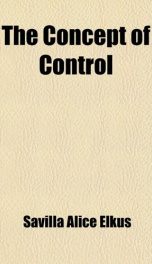the concept of control

Purchase of this book includes free trial access to www.million-books.com where you can read more than a million books for free. This is an OCR edition with typos. Excerpt from book: CHAPTER III BIOLOGICAL In times past and present theories of vitalism have been and are asserted which claim to account for certain peculiarities of the organic world which are incapable of explanation by mechanical principles. While the formulations of the theory have undergone modifications with the development of biological science, the logic of the argiiment remains generally the same. Thus in earlier times c a special vital force was presupposed to account for such features as the orderly structure of the living organism, the process of development and the adaptation of organ to function. This specific energy constituted something supermechanical in nature, not subject to the laws of matter and motion, and, according to certain formulations, accomplished its work through a preconceived ideal/1 But vitalistic theories, both those which have ceased to attribute a human intelligence to the extramechanical agent and the earlier formulations, are prone to be stigmatized as unscientific. What, then, is the ground of those objections which regard such reasoning as a false step in scientific procedure? The import of these criticisms, I take it, may be stated as follows: Vitalism must of necessity be worthless as a means of explanation since its method of procedure contains within it an inherent inconsistency. With the exposure of this inconsistency, vitalism as a scientific theory falls to the ground. It is due to a failure to appreciate the significance of mechanical explanation. Let it be granted for the sake of argument that there are distinguishing organic features, such as, for instance, the harmonious functioning of the organism. Whatr vitalism presupposes in this case is an entity to account for such an arrangement of the material constituents as induced such a resul...
Info about the book
Author:
Series:
Unknown
ASIN:
B00097NSGM
Rating:
3.5/5 (5)Your rating:
0/5
Languge:
English
Users who have this book
Users who want this book
What readers are saying
What do you think? Write your own comment on this book!
write a commentGenre
if you like the concept of control try:
Other books by this author
Do you want to exchange books? It’s EASY!
Get registered and find other users who want to give their favourite books to good hands!

